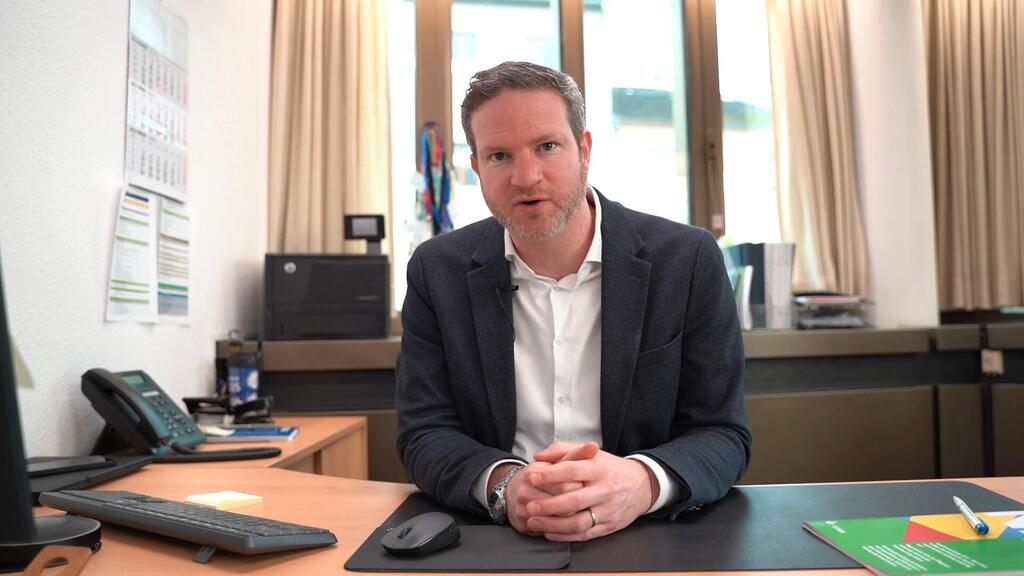Getting your Trinity Audio player ready...
The Jewish community of Frankfurt, one of the largest and most active in Germany, is facing a wave of fear and anxiety following the Hamas massacre in Israel and the subsequent surge in antisemitic incidents across the globe, including Germany.
“First of all, I think the barbaric massacre on the 7th of October and the following up antisemitic wave in the whole world has also influenced Jewish life in Germany quite a lot,” says Aron Schuster, executive director of the Welfare Board of Jews in Germany. “We do see that especially vulnerable target groups are feeling an increasing insecurity, isolation, psychological stress, fears of the future, restrictions in their daily life. And I think all those are results of antisemitic incidents that have also been the case in Germany.”
Frankfurt's Jewish community facing growing threat
According to Schuster, antisemitism is becoming visible in nearly every aspect of life.
“Antisemitism comes to effect in different ways from different directions. So it's a very, very diverse phenomenon, which is affecting people in so many different situations in their life. For example, students in universities, but also sportsmen during a soccer game against other teams. Incidents in schools. We have of course increasing incidents in the internet, in social media platforms where people are extremely hard confronted with antisemitic threats,” he explains.
He also points to political changes that further endanger the Jewish community. “We have a political development which is also quite challenging for the Jewish community in Germany as we have a stronger extreme right-wing party which is also acting and speaking in a way that threatens Jewish life in Germany,” he says.
When asked whether Jews are beginning to leave Germany, Schuster says it’s too early to speak of emigration trends. “We can see an increased discussion in every Jewish home about the future of Jewish life in Germany and considering what will be the future way and if is Germany the right way to stay till today," he says. "We can’t see that there are an increasing number of Jewish people leaving Germany or Jewish communities in Germany. So I think we have an increasing discussion and sorrows and fears that are coming up and people really serious thinking about their future.”
In Frankfurt, these concerns are felt on a very personal level by Peter Fischer, a Holocaust survivor who has lived in the city for over six decades. “I’m a child Holocaust survivor. All my family perished during the Holocaust, most of them in Auschwitz. And that’s the story. I was born in 1943, the worst time, in Budapest in Hungary. And I survived as an only child, as an only person of the family," he says.
Fischer, who was adopted in 1946 by Jewish parents, came to Germany in 1959. “I lived here since 1959 actually. And when I came to Frankfurt, it was a nice little city and Frankfurt was a liberal city. Hessen is a liberal state. And so I came here with my parents in 1959,” he says.
But today, he says, things feel different. “I used to feel good here. We have a different situation now compared to the 60s, 70s, etc. Till now the 20s. The whole situation here with the migrants, Islamic migrants, which brought antisemitism to Germany and of course to Frankfurt. Apparently we have 140,000 registered Islamic people compared to 6,400 Jews. So it’s a bad equation,” Fischer explains.
Asked whether he fears for the future of Jewish life in Frankfurt, Fischer is clear: “I don’t know what the future is going to be here in Germany anyway for Jews. I mean if I were younger, I would migrate. I would make aliyah, most probably, because that’s our country. And we see what will happen here in Germany, what will happen in Europe. Europe is going to be Islamized. Countries like France, they already lost. England too. And Germany is on the best way.”
The images from recent pro-Hamas demonstrations in German cities were especially alarming. “It reminds me of this period, like the time of the Holocaust," he says. "It’s not so dramatic. No, it’s just the things that are happening here. We see what happened after October 7th, where people were marching on the streets with the Hamas. And it was the world over, actually, from Sydney to California, everywhere. And in Germany too, in all the cities.”
Fischer refers to a statement made by former Chancellor Angela Merkel: “As Merkel said, we imported antisemitism with these people.” In response to these concerns, Jewish leaders are working to strengthen the social fabric of their communities.
Get the Ynetnews app on your smartphone: Google Play: https://bit.ly/4eJ37pE | Apple App Store: https://bit.ly/3ZL7iNv
“Especially we, as a social umbrella organization of the Jewish communities in Germany which is mainly addressing vulnerable target groups, a main way to react on all those developments during the last two years is to create safe rooms, safe places for those target groups — a surrounding that strengthens their identity and gives them actually what they need to resist in their daily life against all those situations that they are regularly confronted with,” says Schuster.
“Those safe places for children, for youth, but also for the elderly generation, for Shoah survivors, is so extremely meaningful. And maybe has never been so important like in these days.”
Despite the difficulties, Schuster says Frankfurt remains a stronghold for Jewish life. “Frankfurt has become one of the leading Jewish communities in Germany. It is a vibrant and innovative place. Despite the fear — we are still here.”






